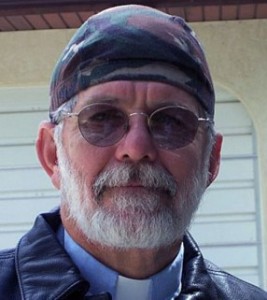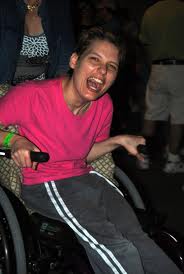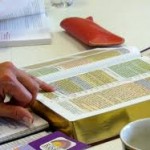 This is a part of the Edgewood United Methodist Church News. Think you will enjoy it.
This is a part of the Edgewood United Methodist Church News. Think you will enjoy it.
American Sign Language
Written By Herb “Padre” Agee
Englewood United Methodist Church

When I was 40 years old, I was pastor at a small, struggling, inner city church in Lakeland. I’m not sure where I got the idea, but I took a sign language class. The teacher was a deaf woman who was also an ordained Assembly of God minister. She had attended Southeastern College in Lakeland, which is an Assembly of God school. I took several classes from her and started learning to sign. I even took some classes at the community college.
The next year I moved to Rockledge to become the chaplain at Wuesthoff Hospital. After a while, someone discovered that I could sign a little bit. They started calling me when a deaf person came into the hospital to register as a patient.
I quickly informed those who needed to know that the hospital was required by law to provide “real” interpreters for deaf patients and to have TTY’s available so they could use the hospital phone in their room. The TTY or TDDallows the phone to become a typewriter of sorts so the deaf patient can communicate with family and friends who also have a TTY. Cell phones, texting, the internet and emails have almost made the TTY system obsolete, but at the time, it was the only way for the deaf to communicate by phone.
We bought several to have available and I made contact with some interpreters to have on call if we needed them. This kept me from having to take the legal responsibility of signing important medical information between doctors, nurses and deaf patients. I wasn’t that good!
One day, a deaf patient came in to register for a test without us knowing he was coming. We usually had an interpreter there waiting for them. Not this time, so… “Who do you call?” You guessed it! The chaplain!
I went down to help with the registration process, thinking that was all that was needed – but, no, he was having an ultrasound of his kidney right after he registered. There was no time to get an interpreter and he did not want to have to come back later, so with his understanding of my limited ability to sign and read his signing (oh, did he understand), we went into the test.
I tried to communicate everything that was happening, but as they were doing the ultrasound of the kidney, I was watching the screen, which he could not see. He signed, “What’s going on?” I responded, “I think you’re pregnant.”
I think all ultrasounds look like a baby.
He laughed and laughed, and the technician looked at me, wondering why he was laughing during the test. I just shrugged as if I didn’t know. We made it through the test, though.
I later met his wife and went out to dinner with them and some of their deaf friends one night. Gradually my connection with the deaf and my signing slowed until I lost touch and, as with any language, “use it or lose it.”
Recently I’ve been drawn back to sign language. I’m not sure why. Maybe it’s because I’m 60 years old and many people I try to communicate with are struggling with their hearing. Some of them have admitted to it and are trying to get use to hearing aids and some of them are living in denial and trying to get by with a little sound and a little lip reading.
 My niece has a child who’s a little over a year old. She and many other people are teaching their children some signs because babies can learn to communicate with sign much earlier than they can talk.
My niece has a child who’s a little over a year old. She and many other people are teaching their children some signs because babies can learn to communicate with sign much earlier than they can talk.
Candy and I were discussing this the other night and I said, “Wouldn’t it be great if everyone was taught sign language as a child and as everyone talked they would also be signing what they were saying? Then, if someone started losing their hearing, they would always know what was being said because of the sign language.” No one would ever be kept out of the communication, even the deaf. They would be able to communicate with anyone and not feel isolated from the hearing community.
Richard Stimson, who leads The Special Gathering, which is a church for the mentally challenged, once told me a story. It was about a man whose whole ministry as a pastor had been in the deaf community. As he sat beside the bed of a deaf saint who was dying, he asked her, “What do you look forward to most about heaven?” Her reply was, “That everyone will know how to sign.” She had no concept of wanting to “hear,” but she wanted to be able to “communicate” with everyone.
Guess what? God knows sign language!
I’m studying ASL again. I’m not sure why. If I lose my hearing completely; none of my friends or family will know sign language. But, maybe I will be able to slip into the deaf community for friendship and communication.
Anyway, if any of you are interested in learning ASL, which is American Sign Language, be sure to check out the website: www.lifeprint.com. It is a great learning site, and it’s free.
Maybe God has a new ministry for me down the road — deaf motorcycle riders. Who knew? But with the loud pipes and road noise, it could happen. Unfortunately, most of the bikers only know one sign. You’ve probably seen it used in traffic.

